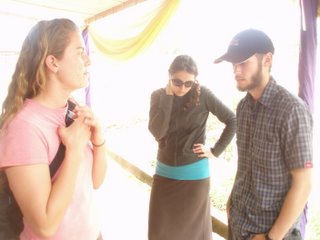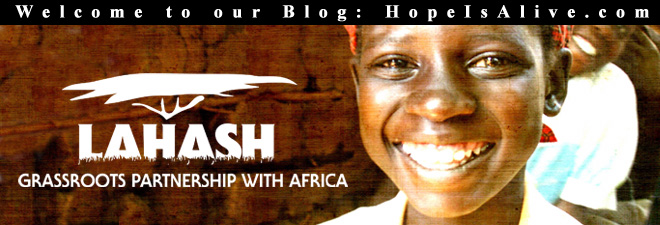
The two faces of the Land of a Thousand Hills
Rwanda is a gorgeous country. Pleasant weather, the gentle hills, the fresh fruit and sugarcane are very evident from the moment you arrive. The Rwandese are very friendly, although they are a bit more reserved than the rest of the people in East Africa. I'm chalking that up to the French influence on the culture.
We have been staying with Francious Sitaki and her family. We have been eating delicious meals here - and we recently discovered why: Francious is a "food scientist" which means each of her meals are nutrient rich, and very elaborate. We've had Matoke bananas, tree tomatoes, homemade yogurt, special rice dishes, Rwandan kababs, deep fat fried bananas, and on and on. The chai here is spiced with a special plant that grows here in Rwanda - they call it ChaChai. Very delicious stuff.
Kigali has been experiencing rapid growth since the Genocide. The roads are the nicest we've seen here in East Africa, and some of the homes and suburb areas are incredible. There is still the ever present lower class, but the upper class seems to be thriving here - without the looming corruption of other nations.
We've had wonderful times so far, lots of laughter, great meals, and amazing views of the countryside. And as Brian Warren pointed out in the comments, Rwanda boasts that it produces the second best coffee in the world (right behind Columbia). I guess you'll have to take their word for it, I'm not much of a coffee drinker.
Ahh, but below the surface - there is a dark shadow that chills the streets. The Genocide from 1994 is utterly disturbing to me. It's so hard to comprehend that these gentle beautiful people went insane and one tribe almost exterminated the other. 1,000,000 bodies were butchered here. I think it is easier to think of wacky German scientists killing the Jews or Gypsies, or maybe the war hardened Japanese killing the Manchurians. But here in Rwanda two tribes that speak the same language, share the same culture, same land for who knows how many years, and only differ slightly in looks and height, collided during the rainy month of April eleven and half years ago. Kids killed their parents, friends killed friends, church goers chopped up fellow parishioners. For 100 days the country was headless as the Hutu tribe lead by the youth of the Interehamwe butchered the helpless Tutsis. It just doesn't seem possible.
But it did happen. We've been to the Mille Colline Hotel (where Hotel Rwanda is based from) we've seen where the 10 Belgian peace keepers were killed. We've seen many churches that turned into sepulcher's as the frightened civilians who sought safety in God's temples were massacred.
This morning we visited Nyamata Hospital, a health center that Emmanuel Sitaki is connected to. Then we visited the Nyamata Genocide sight, which was a church. On the 14 of April 1994, up to 10,000 people sought safety in the church and surrounding area. The church was riddled with bullets and then the mob entered killing men, women, and children. We saw the alter cloth which was stained with blood 1 1/2 feet deep. We saw a wall that was used to crush babies. And then we entered the crypt. Thousands and thousands of skulls and other assorted bones were crammed into several dark chambers underground. I can't describe the feeling of being in there. It was so sad to comprehend the madness that took place.

The people all have stories. The pain is there for almost every citizen. And sometimes the evidence is physical. Women have AIDS from being raped. Some people walk around with machete scars on their faces. Some are missing limbs. The Tutsis still are wary of another outbreak.

We are all processing this as we move along. It's sometimes hard to laugh, or enjoy the moment knowing the history. The two faces of Rwanda are so violently contradictory.
The people though at the moment are so courageous and in general full of hope. The Tutsis have moved back en mass, many neighbors have forgiven their fellow neighbors. Tourism is picking up. The church here has decided to jump full board into reconciliation. We see Tutsis and Hutus working together. And so we have hope for the nation, hope for the children, and hope for humans. That we can change, that we can put aside the darkness of our past, that we can seek peace, hope, forgiveness, love, and compassion. That God can give second chances even in a nation of murderers.
I am in awe of the Rwandans. I can still point out grudges from gradeschool and high school. I can point out things I can't bury in my life. But for the friends we've been around, there is joy and laughter in the everyday conversations. Little giggles and warm handshakes. It's encouraging to know that life can go on even through the saddest valleys.
Tomorrow we are going to see about 100 or so orphans from the country. Emmanuel's ministry is trying to give them a chance at education, food, and a long life. We are going to visit with them, and then hopefully head over to Lake Kivu sometime this weekend. We are going to worship with a local church. We are going to enjoy life with the fellow Hutus and Tutsis here. Please pray for us. And pray with us for this land and people.
- Dan
















 I've decided to partner with the church here in Dodoma in providing some basic care for orphans in the community. Compassion is a great ministry, but it only takes care of kids from family units. Orphans are not allowed to be sponsored. So we've discovered there is a whole other class of kids that are even more desperate and needy - without any support right now. The team here is so professional, and they've had several years of experience with compassion. Another really cool thing is that Pastor Amos wants the Tanzanian community to be involved in the project as well. So we are going to offer $7 per kid per month, and he will find Tazanians to provide the other $7 per month bringing in a total of $14 per orphan kid. This is just about the same amount of money that makes it to each Compassion kid ($16). So we'll start off with a project of 10 kids here in Dodoma. If you'd like to sponsor a kid, or even all ten of them (for $70 per month), let me know - email me at
I've decided to partner with the church here in Dodoma in providing some basic care for orphans in the community. Compassion is a great ministry, but it only takes care of kids from family units. Orphans are not allowed to be sponsored. So we've discovered there is a whole other class of kids that are even more desperate and needy - without any support right now. The team here is so professional, and they've had several years of experience with compassion. Another really cool thing is that Pastor Amos wants the Tanzanian community to be involved in the project as well. So we are going to offer $7 per kid per month, and he will find Tazanians to provide the other $7 per month bringing in a total of $14 per orphan kid. This is just about the same amount of money that makes it to each Compassion kid ($16). So we'll start off with a project of 10 kids here in Dodoma. If you'd like to sponsor a kid, or even all ten of them (for $70 per month), let me know - email me at 

 It's been great to see Jo and the team here and all the hard work they've been doing in Tanzania. Nick (from Eldoret) and Jo are pictured below.
It's been great to see Jo and the team here and all the hard work they've been doing in Tanzania. Nick (from Eldoret) and Jo are pictured below.
